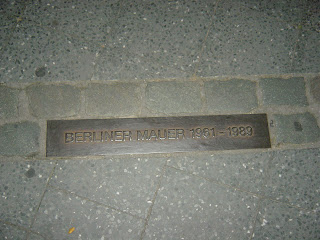We left the Netherlands early in the morning and arrived in Berlin, Germany, in the late afternoon. It was exciting to drive on the German autobahn with its "no speed limit" rule along most stretch of the highway. I was blown away by the number of cars that zipped by me at unbelievable speed of over 150 kph (~93 mph)!
Driving in Berlin, however, proved to be frustrating when I got lost while trying to find the Schlafmeile Hostel. When we finally found it, I was annoyed to learn that the room was still not ready to be checked in when it was already late and almost time for dinner! There was no better alternative than to wait for the room to be cleaned. One night there cost €54.
After sorting out the room issue, we took the train to the Philharmonic to watch the Berlin Philharmonic evening performance conducted by Fabio Luisi, with amazing French pianist, Hélène Grimaud, and the Dresden State Orchestra. We arrived a little late (panting) and barely missed the first part of the performance (as they would refrain entry during the performance). It was really nice to sit down, relax, and listen to live classical music after a stressful day. The 3 Berlin Philharmonic tickets cost €38.
The program for the night:
Arcana for great orchestra [1925-27]
Ludwig van Beethoven [1770-1827]
Concerto for Piano and Orchestra No. 4 in G major op. 58 [1805-06]
Richard Strauss [1864-1949]
Eine Alpensinfonie for great orchestra op. 64 [1899-1915]
Sächsische Staatskapelle Dresden / Fabio Luisi
Varèse – Beethoven – Strauss
Arcana for great orchestra [1925-27]
Ludwig van Beethoven [1770-1827]
Concerto for Piano and Orchestra No. 4 in G major op. 58 [1805-06]
Richard Strauss [1864-1949]
Eine Alpensinfonie for great orchestra op. 64 [1899-1915]
Copied verbatim:
After years of absence, the Sächsische Staatskapelle Dresden returns to Berlin with their new head conductor, Fabio Luisi, and a programme which is perfectly tailored to the orchestra. With this orchestra, the composer Richard Strauss personally conducted the premiere of his Alpine Symphony in Berlin in 1915, which helped ensure the ensemble a grandiose success. Like Ingo Metzmacher in the musikfest programme of the DSO Berlin, Fabio Luisi combines the music of Richard Strauss and Edgard Varèse. Varèse’s oceanic and magical Arcana, a powerful and illustrious display of sound, provides the backdrop for the evening’s soloist: Hélène Grimaud. This young French star performer, known for her passionate work in the preservation of wolves, devotes herself to Piano Concerto No. 4 by Ludwig van Beethoven, the first composer in the history of Western music who was prepared to give up “good tone” in order to take music to new extremes. The programme of the Sächsische Staatskapelle requires the utmost concentration from the musicians. As Hélène Grimaud put it, “The concentration required when confronting a wild animal is the same that one needs when getting to the heart of a piece of music. Neither can be approached in a half-hearted manner, nor can one attempt to meet them halfway. You always have to stay focused – you can never just switch on the autopilot. The way to the heart of a piece of music demands one-hundred percent dedication – intellectually, emotionally and psychologically.”
After the splendid performance at the Philharmonic, we took a leisurely stroll in the cool night to see the Brandenburger Tor and the nearby Riechstag. We also saw ground remnants of the old Berlin Wall. Berlin was a fine city to visit - I only wished we had more time to spend there, but the plan was to drive to Warsaw, Poland the following day. Generally speaking, Berliners were gracious hosts - we were assisted by good Samaritans everywhere we go; some even walked up to us to ask if we needed help! I was also approached by a scout to be in a film (gasp!), which I politely declined. Me? In a film? Thanks, but no thanks! :)
Next post: Poznan & Warszawa (Warsaw), Poland
Previous post: Liège, Belgium






















No comments:
Post a Comment